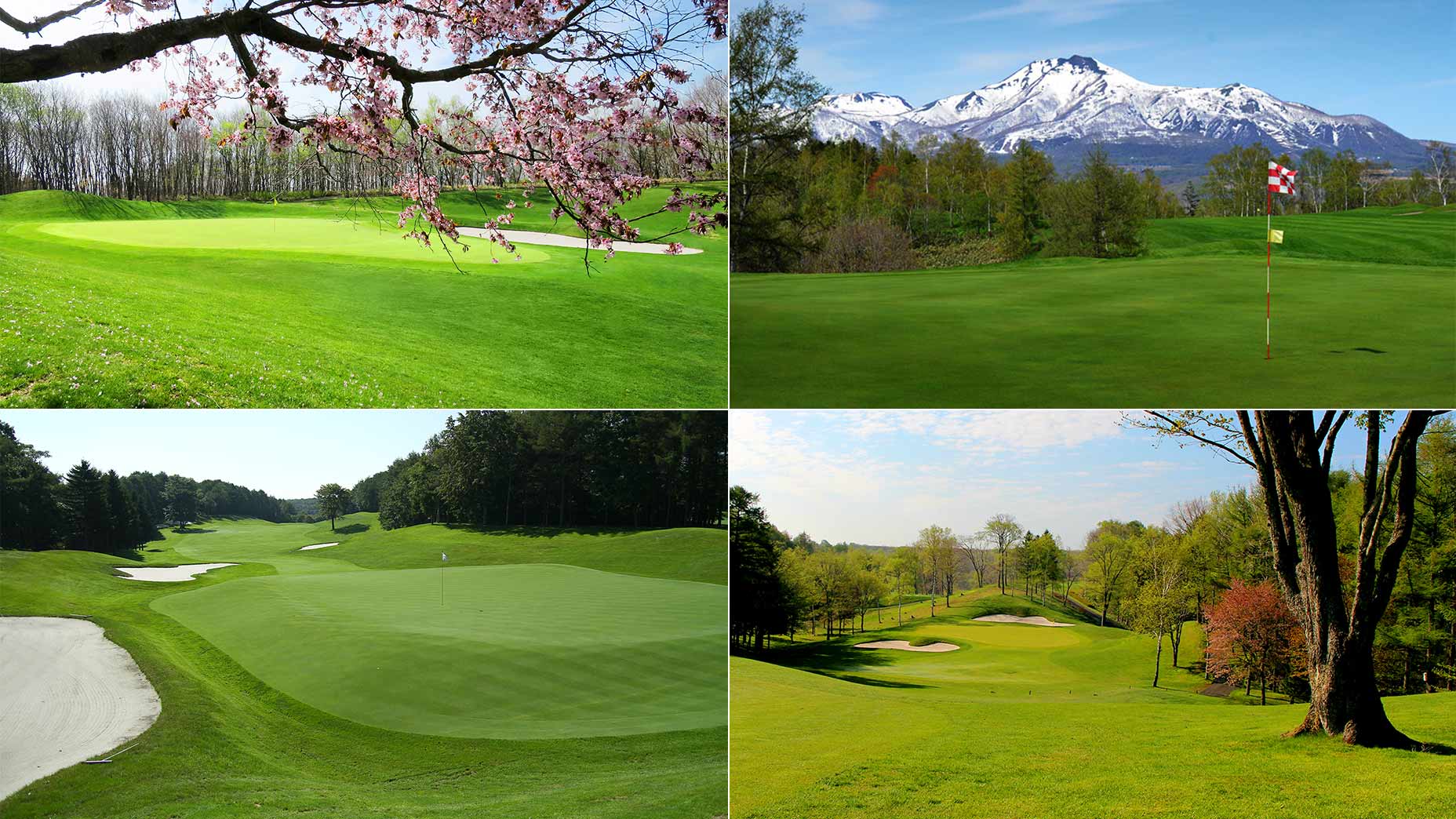
With courses beneath snow-capped mountains and hot springs for days, Hokkaido is the golf buddies’ trip you didn’t know you needed.
Courtesy Photos
Japan is back in the golf world’s high beams this week, with the PGA Tour touching down on Japanese shores for the sixth Zozo Championship. Soon, at Accordia Golf Narashino Country Club outside Tokyo, local hero Hideki Matsuyama (and his now-famous caddie Shota Hayafuji, he of the Masters 18th-green bow) will battle the likes of Sahith Theegala, Xander Schauffele and defending champ Collin Morikawa.
But while FedEx Cup points are being delivered, a 75-minute flight up north, on the wild island of Hokkaido, there is a fabulous, little-known Japanese golf adventure to be had for the rest of us — one sure to make all golf buddies/senseis jealous.
A different kind of slope rating
Hokkaido is the northernmost island in Japan. Over 5 million people call it home. Americans who know Hokkaido probably know it for — well, besides the namesake beer of its capital city Sapporo — its skiing. Each winter (known locally as the white season), Hokkaido becomes the ski mecca of Asia — when cold wind blasts off Siberia, picks up warm Japanese air, then promptly hits Hokkaido’s mountains. Think the lake effect on a gargantuan scale. Between 45 and 50 feet of snow fall per year — over 500 inches of deep, dry powder sitting at such low elevations, even green-run-relegated beginners can experience it. Such Michelin-starred snow brought the Winter Olympics to Sapporo in 1972, and each December it still brings skiers scuttling to Hokkaido’s resorts like surfers to Tahiti’s Teahupo’o’s break.
But during the summer and fall months (the green season), Hokkaido is a golfer’s paradise. There are 150 golf courses on the island, views to stop Shinkansen bullet trains, plus a temperate climate that is a welcome relief from other more sweltering parts of Japan and Asia.
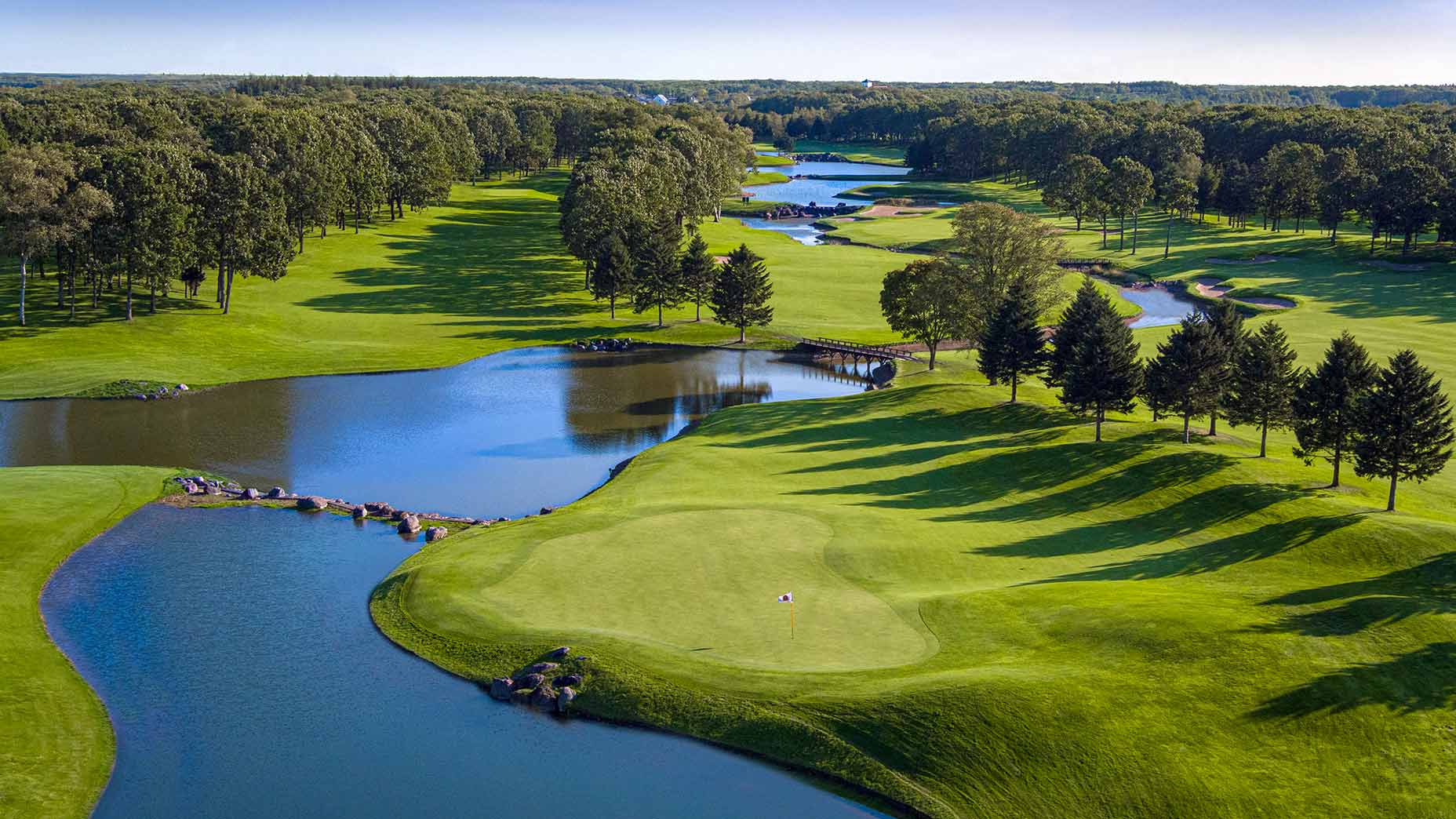
Courtesy Photo
Where to play
A superb start to any Hokkaido golf trip is the Nidom Classic Course, 45 minutes from Sapporo. Nidom’s Nispa course has hosted the Japan PGA Matchplay Championship, the Japan Senior Open and the Japan LPGA Championship. Nidom means “abundant forest” in the indigenous Ainu language; appropriate since the course is surrounded by a 1,200-acre forest of Sakhalin spruce, Japanese larch and white oak. (Sika deer will likely survey your 8-footers for double-bogey with curiosity.)
Farther west, there’s Niseko Golf Course, an Arnold Palmer design with jaw-dropping views of Mt. Yotei (which resembles Mt. Fuji so closely, some visitors are confused to learn that Mt. Fuji is actually 700 miles away, on the larger island of Honshu). There’s also the popular Hokkaido Classic Golf Club, a Jack Nicklaus design dating from 1991, inspired by his famed Muirfield Village. Back toward Sapporo, another Hokkaido hit is Sapporo Golf Club’s Wattsu course, which has hosted the Japan Golf Tour’s ANA Open since 1973. Japanese legends Ryo Ishikawa, Jumbo Ozaki, Tommy Nakajima and Isao Aoki have all won on this course, a 1958 design from renowned Japanese architect Seiichi Inoue.
Other popular tracks to check out are Hokkaido Brooks Country Club (designed by Ed Sneed and Taizo Kawada, with beehives for yardage markers, which has hosted the prestigious Japan Amateur) and Otaru Country Club (Hokkaido’s oldest golf club, founded in 1928, and past host of the Japan PGA Championship).
At all of these courses, you’ll be greeted with friendly bows when you arrive, plus, at many, futuristic flourishes like self-driving golf carts via remote-control and Roomba-like robot grass mowers. (Impressed? Some Japanese driving ranges even have robot ball pickers.) One tip: bring meishi (business cards) with you, as card exchange is a deeply revered tradition in Japan. If you want to really please your Japanese playing partners, get meishi printed in Japanese at any Kinkos in Sapporo — sure to cause double-takes and delighted smiles.
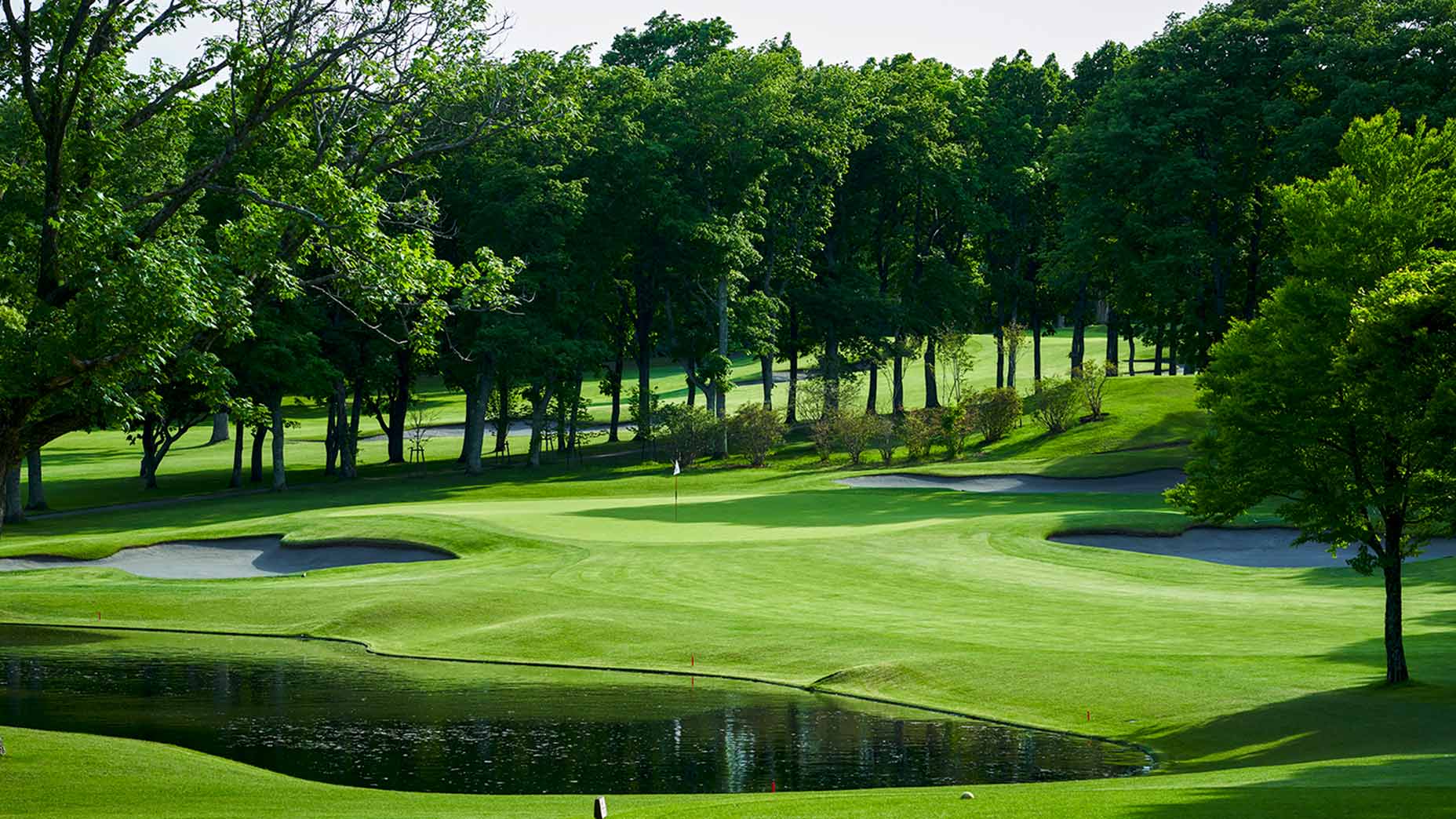
Courtesy Photo
Après-golf: A restorative soak
Between rounds, visiting golfers would be wise to do as the locals do, and hit the onsen. These are natural hot-springs heated by underground water and are a staple of Japanese life. Almost every town in Japan has a local onsen (as do most golf course clubhouses), so adding in onsen visits will be a cinch. They are truly everywhere. You can even watch the Hokkaido Nippon-Ham Fighters (the former baseball team of MLB superstar Shohei Ohtani) inside their stadium from an onsen. (No skinny-dipping allowed, as you’ll be on the Jumbotron.) What makes Hokkaido’s hot springs so special, however, is the preponderance of “wild onsen” — natural hot-springs out in forests and on edges of lakes and ocean tidal zones. There are wild onsen all across Hokkaido, each one an incredible 19th hole activity. Some extra-special wild onsen to consider:
— Lake Kussharo, in Eastern Hokkaido’s Akan-Mashu National Park, contains roughly 10 free onsen on its shores, including the unforgettable Kotan Onsen, dutifully maintained by local volunteers.
— Shikaribetsu Gorge, in central Hokkaido, is a serious onsen hotspot. This postcard-perfect camping haven contains no less than seven wild onsen. The most spectacular, Gakeshita-no-yu Onsen, has a small cave into which bathers can squeeze, mid-soak. (Hokkaido Wilds, an outdoor adventure website, has the gorge entrance information.)
— Sandan Onsen, on the northeast of Hokkaido, is a magnificent three-tiered onsen in a forest, near the trailhead for the volcano Rausu-dake.
— Want a wild onsen set literally in the intertidal zone? Try Aidomari Onsen on Hokkaido’s northeast tip or Mizunashikaihin Onsen, just east of Hakodate.
— Not actually wild, but if you crave creature comforts, or plan on sticking closer to Sapporo, one indoor onsen facility worth a morning trip is the locally loved Yunohana Jozankei, 40 minutes from Sapporo. Here, you’ll likely be the only American… and will be tempted to never leave.
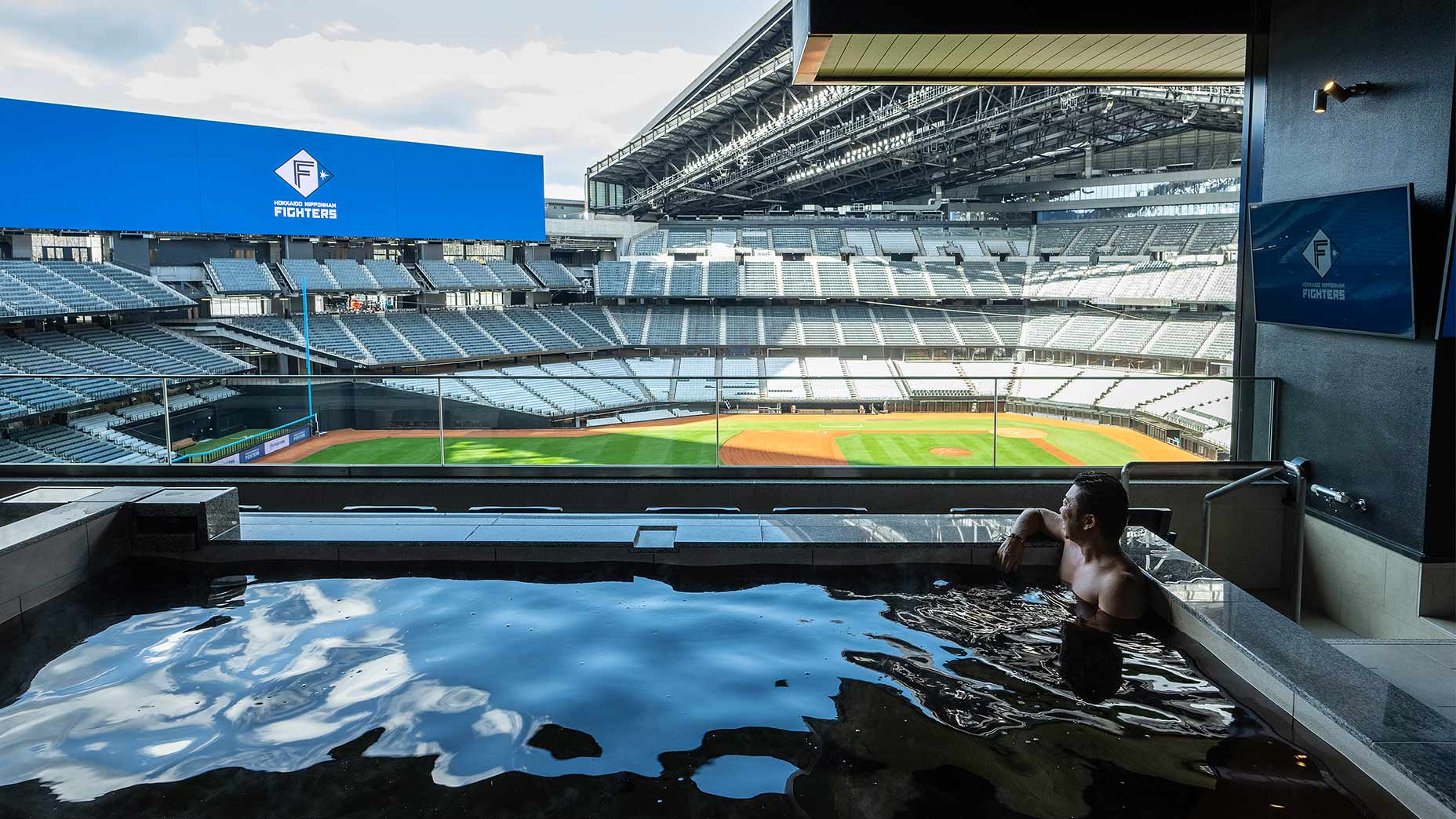
Courtesy Photo
Park Golf: The perfect wager settler
It’s not only regular golf that is an obsession in Japan. Park Golf, a shorter version of golf, with holes from 33 yards to 110 yards and a single mallet-like golf club, is hugely popular in Japan (there are 500,000 park golfers, many in their 80s and 90s). Think what pickleball or padel is to tennis, but with beautifully manicured Park Golf courses all over the country.
The best part: Hokkaido is both the birthplace and epicenter of Park Golf — boasting a staggering 800 of Japan’s 1,200 Park Golf courses. This means, practically speaking, that you are sure to run into several Park Golf courses on your visit. They are set in seemingly every public park and town, with high numbers of older Japanese men and women teeing it up. A game of Park Golf is a must-do while you’re visiting Hokkaido. It is seriously local, the perfect way to settle outstanding golf wagers and, most of all, great fun.
The three best starter courses for entrées into Park Golf, all in the Sapporo suburbs, are Wattsu International Park Golf Course (Kitahiroshima City), Ebetsu Kakusan Parkland (Ebetsu City) and Lawnscape Wattsu (Kitahiroshima City). Want a quick introduction to the rules? Check out the Nippon Park Golf Association’s online rulebook. Even better, play an introductory round before your trip at America’s first Park Golf Course — Destroyer Park Golf Course in Buffalo, N.Y. Want to truly test your Park Golf skills? You can compete in numerous Park Golf tournaments in Japan, as this author did last year in the All-Japan Park Golf Championship.
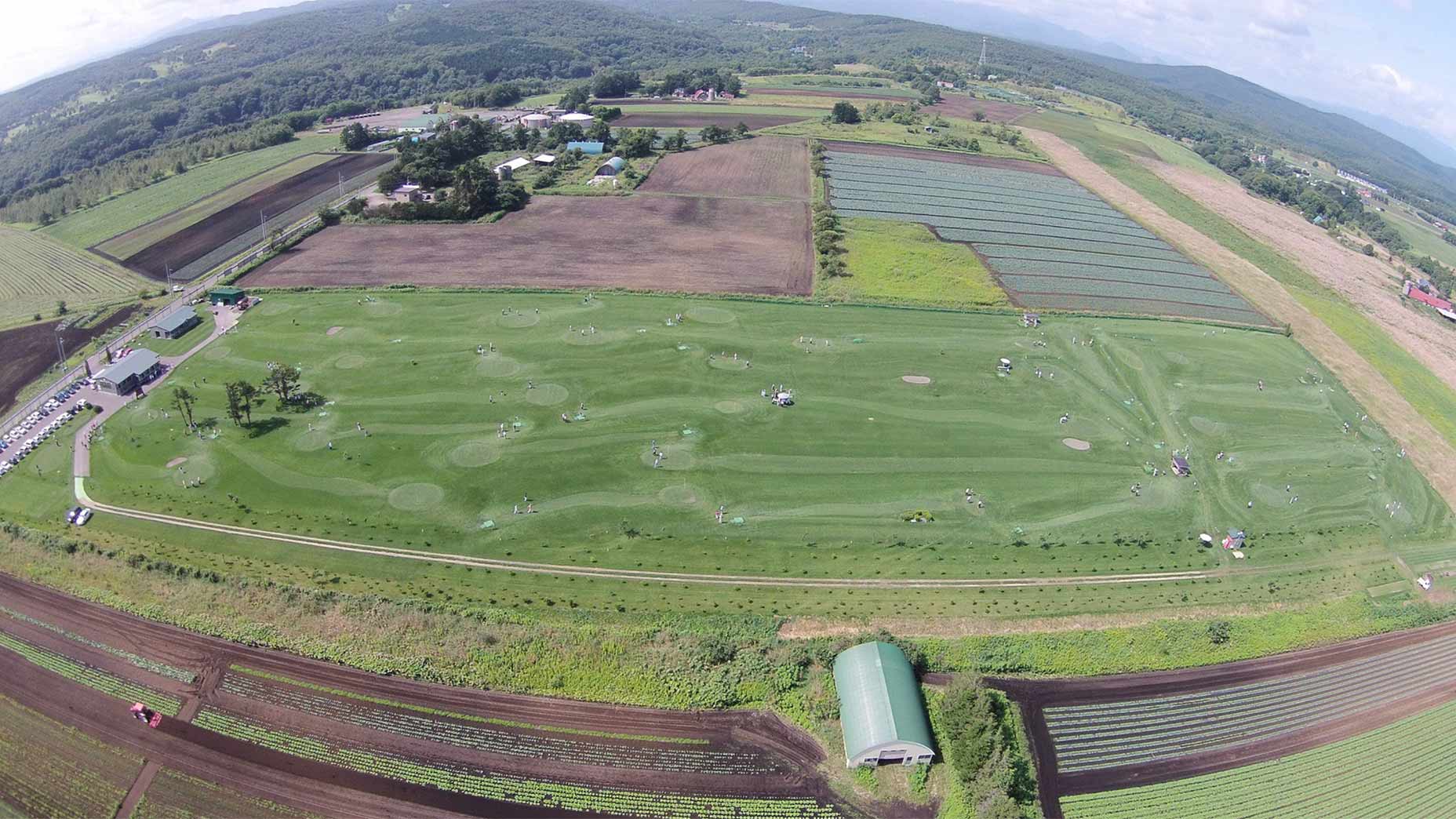
Courtesy Photo
Rounding out your rounds
For those aching to add one more excursion to all the golf, here are three super-special adventures to tackle, exploring Hokkaido’s vast wilderness:
— Head to Rausu, a charming fishing village on Eastern Hokkaido’s Sheritako Peninsula. Here, you can jump on a wild boat tour run by Evergreen Shiretoko Nature Cruise, aboard their 50-person boat with English-speaking crew. On this two-hour boat tour, captained by friendly fishermen, you’ll see whales and bears, plus heaps of other wildlife.
— Take a Japanese whiskey tour at Akkeshi Distillery, in eastern Hokkaido. Set near the ocean, the distillery offers a Japanese spin on Islay’s peaty malt whiskeys. Plus, each day, fishermen haul in oysters alongside the distillery, which you can sample at numerous oceanside oyster bars in town, including Kakiba, owned by Mr. Hitoshi Nakajima, who personally prepares a local variety called kakiemon.
— Love to fish? There’s prodigious fishing for rainbow trout, Japanese char, and kokanee on Lake Akan in eastern Hokkaido, from May 1 through the end of November. You can book a tour with veteran fishing guide Shigeru Takada at Tsuruga Adventure Base. (And yes, there are many lakeside onsen nearby, for a post-angling soak.)
Getting there
ANA flies from most major U.S. cities to Hokkaido’s quaint New Chitose Airport, with a connection in Tokyo at either Haneda or Narita Airport. Round-trip fares start at about $950. Once on the ground, you’ll find that the dollar goes far these days, with exchange rates currently around 150 yen to the dollar (almost 50 percent higher than five years ago). Enjoy the extra sushi.
Oliver Horovitz is a New York City-based golf writer and the author of “An American Caddie in St. Andrews.” He has made four trips to Japan, including a 2023 visit to compete in the All-Japan Park Golf Championship (in which he finished 479th out of 481 competitors).


